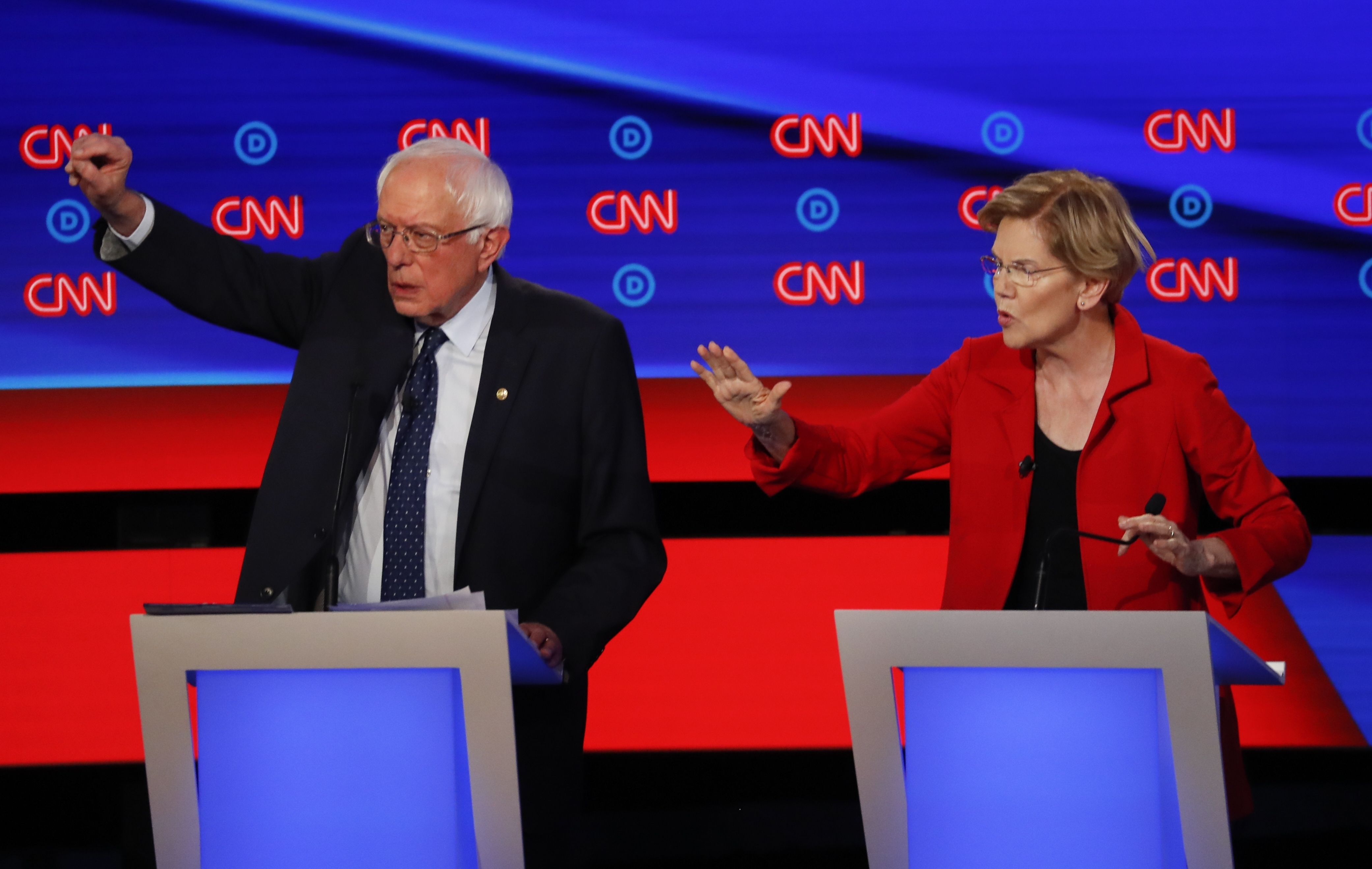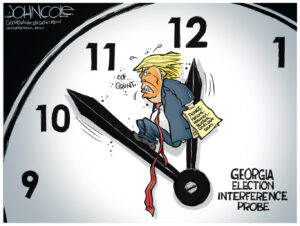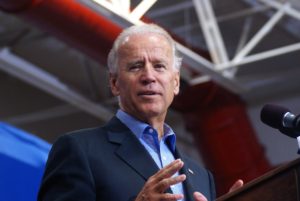The Emerging Divide Between Sanders and Warren on Medicare for All
Economist Robert Pollin answers key questions about the two senators' approaches to health care as Warren beings to carve her own path. Paul Sancya / AP
Paul Sancya / AP
Economist Robert Pollin, co-director of the Political Economy Research Institute (PERI) at the University of Massachusetts at Amherst, admits there is no “perfect way to fund” Medicare for All but he remains on a mission to explain why simplicity is key when it comes to building a more efficient, more humane, and less costly alternative to the current for-profit status quo.
Despite a detailed economic analysis he and his PERI colleagues put out last year—presented in a 200-page study titled “Economic Analysis of Medicare for All,” which examines the costs and benefits of legislation introduced in Congress by Sen. Bernie Sanders of Vermont in 2017—Pollin remains frustrated by the failure of many to grasp, or be honest about, the clear benefits of a single-payer system.
“The biggest thing that Americans will be enjoying will be something that is already being enjoyed in other advanced economies—i.e. guaranteed access to good-quality health care when one needs it, and getting the needed care without worrying about whether one can make all the various kinds of insurance payments.”
A proposal like the one put forth by Sanders in 2017, says Pollin—as well as the updated version now in the Senate as “The Medicare for All Act of 2019” (pdf)—will drive down healthcare costs for the United States overall even as everyone in the nation enjoys full and expanded coverage; even as utilization of care goes up; and even as no family ever again faces financial ruin due to tragic injury or unexpected illness.
The conversation around Medicare for All has been a focal point in the 2020 Democratic presidential primary and with leading progressives like Sanders and Sen. Elizabeth Warren facing off against their more centrist top-tier rivals Joe Biden and Pete Buttigieg who oppose it, Common Dreams asked Pollin for his perspective on some of the key facets of the current debate.
The healthcare issue will almost certainly come up during Wednesday night’s Democratic Debate, hosted by NBC News, and candidates will once more try to make their case on the direction the country must take to address the crisis of medical bankruptcies, skyrocketing drug costs and insurance premiums, and the fact that tens of millions in the U.S. remain uninsured or underinsured.
Sanders has long been recognized as the nation’s leading political champion of Medicare for All, but Warren—who has repeatedly said “I’m with Bernie” on his plan—has, in recent weeks, carved her own path by offering alternative approaches regarding key implementation issues. At the beginning of the month, Warren put a detailed “pay-for” funding plan for Medicare for All in which she claimed that unless you are “in the top 1%, Wall Street, or a big corporation—congratulations, you don’t pay a penny more and you’re fully covered.”
Sanders, on the other hand, has admitted that under his approach taxes would go up for some (but not all) middle class and working families, but that without copays, deductibles, and higher costs of care—they would come out way ahead financially and in terms of security. While Warren’s financing plan received praise by many, it also raised flags for some longtime single-payer activists and policy experts who warn that her funding approach is more regressive than what Sanders has put forth. In an interview with ABC News on Nov. 3, Sanders said his plan was “much more progressive” than what Warren is proposing.
Last week, Warren unveiled a separate transition plan for Medicare for All, which once again drew both praise and condemnation from progressive observers and experts. One of the key criticisms was that Warren will essentially move, if elected, to institute a public option styled on Medicare at the outset of her term and then subsequently—no later than her third year in office, she said—would push for Medicare for All.
“Nobody is purveying more nonsensical double-talk around Medicare for All than Biden.”
With Buttigieg and Biden both attacking Medicare for All with talking points that sound a lot like the ones put forth by the insurance and pharmaceutical industries (not to mention Republicans), Pollin says clarity on key matters is needed now more than ever. Despite nearly two dozen interviews with journalists this month, he lamented, many continue to get the big picture of the story wrong.
Having done extensive research on Medicare for All, the Green New Deal, and the minimum wage—all key issues in the current primary—Pollin has become a highly sought after economist lawmakers and campaign policy shops. As such, he has provided input to both the Sanders and Warren campaigns in recent months, though he is not backing either candidate nor has he served in an official capacity for their campaigns.
In his interview with Common Dreams—a back and forth exchange which took place via email over recent weeks—Pollin explained that he was “just offering ideas as Bob Pollin, economics scribbler, with nothing politically at stake” for either himself or his fellow researchers at PERI. “I hope that this discussion helps clarify questions for lots of people,” Pollin said, “and also helps give an additional boost of confidence to Medicare for All supporters, against this relentless onslaught of outrageous attacks.” Pollin had choice words for both Buttigieg and Biden.
In order to get to the heart of understanding the economics of Medicare for All, he said, what’s needed most—beyond understanding the basic concepts of cost-savings—is being “open-minded in weighing the relative strengths and weaknesses” of the various ways such a proposal can be funded.
“As for the financing plan, you can almost put mine on the back of a matchbox.”
There are many important details to work through, says Pollin, but he wants people to understand there is a very simple bottom line: The United States of America can “deliver good-quality universal health care” to all its residents for less overall cost than we are doing now. Period.
“As for the financing plan, you can almost put mine on the back of a matchbox,” Pollin said, even as he recognized that the intense political battles ahead will be anything but simple.
If and when Medicare for All is achieved, he notes, “The biggest thing that Americans will be enjoying will be something that is already being enjoyed in other advanced economies—i.e. guaranteed access to good-quality health care when one needs it, and getting the needed care without worrying about whether one can make all the various kinds of insurance payments.”
Common Dreams: If it is “easy to pay for something that costs less,” as you stated nearly a year ago when introducing PERI’s study that reviewed the Medicare for All Act of 2017 (an earlier iteration of the current bill in the U.S. Senate put forth by Sen. Bernie Sanders earlier this year), why is it that the discussion around funding such a proposal continues to be politically unsettling for candidates and mired in complexities?
Robert Pollin: There are a few reasons for this, in my view. I’ll start with the most important reason, which is willful obfuscation, distortion or ignorance. I say willful because the basic facts are available for anyone to grasp if they choose to do so. I know this firsthand, since I have given about 20 or so interviews on exactly these questions over the past month. I tell everyone the same simple story, which is, in round numbers:
1. We can deliver good-quality universal health care to all U.S. residents at approximately $3 trillion for the first year of operation.
2. Total public funding of U.S. health care is, right now, at about $2 trillion.
3. That means we need to raise another $1 trillion in additional taxes, to substitute for the premiums, deductibles, co-pays, and out-of-pocket costs we now pay to private insurance companies.
4.We can raise that additional $1 trillion in a variety of ways. In my own proposal, I give priority to a simple set of new revenue sources that will support increased equality—i.e. help reverse the sharp long-term rise in inequality. My main proposals include, again, in round numbers:
- $600 billion from new business taxes. This will mean a cut of about 8 percent on what businesses, on average, now spend on covering their workers. We can get to $600 billion either through a 1.8 percent gross receipts tax or an 8.2% payroll tax. There are advantages and disadvantages of both approaches.
- $200 billion from a 3.75 percent sales tax on non-necessities. Spending on food, housing, and education will all be exempt. For lower-income households, about half of all spending will be exempt from the tax. Current Medicaid recipients will also get a tax credit to offset their sales taxes on non-necessities.
- $200 billion from a wealth tax of 0.38 percent.This would exempt the first $1 million in wealth.
5. It is straightforward to project these figures into a 10-year framework, as is typically done in Washington policy circles. That is because it is reasonable to conclude, conservatively, that once we establish Medicare for All, health care spending is not likely to grow more quickly than the rate at which the overall economy grows (more likely health care spending will decline further as a share of the economy). Because of this, the growth of the economy overall will itself generate the needed additional tax revenue to finance Medicare for All without having to increase anybody’s tax rate.
So, voila, that’s it: We need to raise $1 trillion in Year 1. We get it from $600 billion in business taxes, and $200 billion respectively from a sales tax and wealth tax. The additional revenues we will need in subsequent years will come as a matter of course as the overall economy grows. Simple, right?
Some of the journalists I have spoken to report this story accurately, but at least half do not. As for presidential candidates, I have to assume that, for example, Joe Biden and Pete Buttigieg are engaging in deliberate obfuscation. This is for the purpose of supporting their own proposals through which, to paraphrase Ralph Waldo Emerson, ‘private health insurance companies remain in the saddle and ride humankind.’
Leaving aside for the moment Warren’s specific pay-for proposal which she released recently, what should the U.S. public—assuming they remain skeptical or concerned about the price tags they are being presented with—understand about Medicare for All’s ability to deliver universal high-quality health care at lower costs to everyone?
Those were, of course, the fundamental questions that my co-authors and I worked on and tried to answer fairly and rigorously in our 2018 study. Here are the very basics of what we found:
1. We estimated that, as a high-end figure, total demand for health care would rise by about 12 percent. This 12 percent estimate is higher than prominent critics of Medicare for All, including Prof. Kenneth Thorpe and Charles Blahous of the Mercatus Institute.
2. Working from the research literature, we estimated that Medicare for All could generate total cost savings in the range of 19 percent relative to our existing system. There are two huge sources of cost savings: a) dramatic simplification of administrative costs by getting rid of the current multi-payer system; and b) bringing down prescription drug prices by an average of 40 percent. As it is, other advanced economies are now spending between 50 – 60 percent less than we do now while delivering, on average, better heath outcome to their populations.
3. As a general proposition, if all other advanced economies are delivering universal health care with better overall health outcomes than the U.S., and are spending roughly one-half of what the U.S. spends per person, then it shouldn’t be such a stretch to think that we, in the U.S., can design a Medicare for All system that can accomplish what has long been a standard feature of how people live in other advanced economies.
Sanders has continued to say its premature in some ways to have this detailed discussion about funding, but Warren apparently felt it necessary to go to work on a plan that would prove that middle class families would pay “not a penny” more in taxes. Is this more politics than economics?
I clearly don’t think it is premature to have detailed discussions on funding Medicare for All, since my co-authors and I wrote a 200-page study which addresses exactly that question—how to fund Medicare for All, in detail. How Sanders or Warren should handle the matter politically is another matter. Again, as a matter of principle, as opposed to politics, I actually favor middle-class people funding Medicare for All in part. My view is reflected in my specific funding proposal, that includes a sales tax on non-necessities. But as I note above, in my proposal, most of the additional funding for Medicare for All will come from business taxes and a wealth tax. The net result is that, with my proposal, the U.S. middle class will get a financial windfall under Medicare for All. We estimated that, for a household earning at the U.S. median income of about $60,000 per year, savings on health care costs—that is after getting rid of all premiums, deductibles, co-pays, and out-of-pocket expenses but now paying the 3.75 percent sales tax on non-necessities—will be between $1,600 and $8,400 per year. The differences in savings are due to what kind of health insurance this family will have had prior to Medicare for All. But the point is these families will see between $1,600 and $8,400 more for themselves under Medicare for All—the equivalent of an increase of between roughly 3 and 14 percent in their available income. This is in addition to now having full access to good-quality health care and never having to experience any kinds of financial traumas when faced with a serious health problem, for themselves or a family member.
There seems to be confusion—or at least some debate—over what constitutes a “tax” and what constitutes an “employer contribution” when it comes to the pay-for plan that Warren put out on Friday. Can you give some perspective on this?
It’s all the same thing. For political reasons, we don’t like to call it a “tax” because people hate taxes. So fine. If that’s the big hang-up, let’s call it an “employer contribution.” Or why not just stick with the term “business premiums,” i.e. a payout to businesses fully equivalent to the premiums they now pay to private insurance companies, except now the funds will be moved into the big Medicare for All funding pot.
What is “tax incidence shifting” and what are candidates, their surrogates, and/or outside analysts (including journalists) getting wrong when they explore this terrain?
Tax incidence shifting is an important part of the overall story. This term refers to, say, a business that pays a tax, but then raises its prices, so that they shift the burden of the tax onto their consumers. A related example is when businesses cover their taxes—or for that matter their health care premiums—onto their workers by reducing wages. We need to try to keep track of these effects in thinking about the fairest ways to finance Medicare for All. Here is one example that is pertinent to the current debate. Many progressive analysts favor a payroll tax to finance Medicare for All. I myself am not opposed per se. But we do have to recognize that a payroll tax raises the costs for businesses to hire more workers. All else equal, it therefore creates a disincentive to hire workers and, correspondingly, an incentive to maybe buy a new machine to increase production at the workplace rather bring on another staff member. One way to handle this problem is to use a gross receipts tax as the business revenue source rather than a payroll tax. With a gross receipts tax, businesses are taxed on their total revenue, regardless of whether their business operations use lots of workers or relatively few workers. As such, the gross receipts tax does not build in any disincentive to hire workers. The gross receipts tax does present other problems of its own. The point is that there is no perfect way to fund Medicare for All. We need to be open-minded in weighing the relative strengths and weaknesses of the alternative approaches.
But is there an important difference between Warren’s “head tax”—a fixed fee which employers would pay to Medicare per employee—compared to the payroll tax? The argument from critics like Matt Bruenig at the People’s Policy Project is that Warren’s head tax is much more regressive than a payroll tax. What is your position on that?
The difference between a head tax and a payroll tax is as follows. Let’s say you and I work for the same company. I earn $50,000 a year and you earn $100,000. Under a head tax, the company would pay the same amount in taxes for both you and I—lets say $6,000 for both of us. But if we go with a payroll tax at 8 percent, then the company would pay $4,000 for me as an employee but $8,000 for you, reflecting that your wages are twice as high as mine. So clearly, the payroll tax is more progressive. However, as I noted above, the overall idea of taxing companies per employee in any way does discourage businesses from hiring workers, all else equal. That is why, as I noted above, it may be advantageous to consider taxing businesses based on their total receipts, or revenues, regardless of whether their firms relies heavily on employing workers or, rather, depends more on operating capital equipment with a smaller workforce. It is also the case that, even if a head tax is regressive—i.e. puts the tax burden disproportionately on the lower-paid workers in a business firm—it doesn’t necessarily follow that the overall Warren taxing proposal is going to end up regressive. To determine that, we have to consider the full set of Warren tax proposals, including the wealth tax and the Wall Street transaction tax. Considering everything, I am nearly 100 percent certain that the Warren tax plan will be highly progressive.
In his initial review, The New Yorker’s John Cassidy concluded, “On health care, as in other areas, Warren has shown a willingness to consider remedies that go beyond the Washington consensus and get to the heart of the matter. She cannot be faulted for lack of boldness.” Yet, if not boldness—in your opinion—what could she be faulted for when it comes to this proposal?
The main author of the Warren Medicare for All plan is Donald Berwick, a former head of Medicare and Medicaid under President Obama. Don is a person of very high integrity and intelligence. In fact, Don worked very hard as a reviewer in helping my co-authors and me improve our own Medicare for All study. I think what Don produced for Senator Warren is quite serious and credible. I do have differences, and I look forward to working through them with Don and members of the Warren policy team (and I should declare an interest here: Warren staffers did consult with me a bit as they worked out their plan with Don. But I was never aware of where they were going with their overall approach. Nor did I know in advance that Don was leading the work). At this point, my two main differences with the Warren plan are: 1) I think their estimate of the overall costs of operating Medicare for All are higher where I put them; and 2) I favor a more simplified financing approach than what they proposed. I say this, but I also recognize that they are operating within a highly-charged political environment in offering their plan. In my case, I am just offering ideas as Bob Pollin, economics scribbler, with nothing politically at stake for me or my co-authors.
Are you saying that Warren assumes overall that Medicare for All will cost more than you believe it will? If so, can you explain why? Second, what would you point to specifically in Warren’s financing plan that is more complicated than you think it needs to be?
I am indeed saying that the Warren proposal estimates significantly higher costs to cover everybody well than what I had estimated. Over a decade, the Warren estimate is around $52 trillion. Mine is a bit under $40 trillion. I am not yet sure where these differences are coming from. The core assumptions of the Warren proposal are not that far off from mine. This is what I look forward to discussing with Don Berwick in the coming weeks. As for the financing plan, you can almost put mine on the back of a matchbox—i.e. the business gross receipts or payroll tax, generating $600 billion, and the sales tax on non-necessities and 0.38 percent wealth tax generating roughly $200 billion each. The Warren plan would require a pretty large napkin, and somebody writing in small print on both sides of that napkin. The main revenue source would still be business taxes. But the plan then introduces proposals around improving tax reinforcement, immigration and cuts to defense spending. It then also introduces targeted taxes on the financial sector, corporations and the richest 1 percent of households. This approach could very well generate the needed revenues. But it does have many more moving parts than what I proposed. More moving parts invites more complications, which, in turn, offers more opportunities for attorneys and accountants to come up with clever tax avoidance schemes.
Mark Zandi, chief economist at Moody’s Analytics who admits he is “no fan of Medicare for All,” said in an CNN op-ed last week that “Warren is right.. her Medicare for All plan won’t raise taxes on the middle class.” Zandi also said he valued that Warren had come to an economist who doesn’t necessarily back the overall proposal to check her numbers—which he said do check out. “That’s the kind of rigor we should expect from all of our presidential candidates,” he wrote. You are an economist who states openly his support for Medicare for All. If that is a moral position, how does that inform your analysis of various plans and approaches?
My credo in all research work is “guilty until proven innocent.” That is, we shouldn’t just accept any research findings at face value, especially when it is research that supports our own prior convictions, and most especially our own research. That is exactly why I asked many leading experts in the field, including Don Berwick, to give our study the most skeptical, rigorous reading that they could, and not worry in the least about hurting anybody’s feelings. That is also why I posted online all the reviews of our study, including the criticisms. If someone such as myself has a prior position in favor of Medicare for All, it is especially incumbent on us to demonstrate that our position holds up under all types of honest skepticism. Otherwise, we are not doing any favors to the causes we believe in. That is basically why it took my co-authors and me 200 pages to convince ourselves that we had a sound case, based on conservative assumptions, demonstrating that Medicare for All could deliver universal high-quality care for all U.S. residents at significantly lower costs than our present system.
You wrote Sanders an open letter in October about funding Medicare for All. Can you explain why you wrote that and explain briefly what you expressed to him? RESPONSE:
Members of the Sanders policy staff asked me to write the open letter to Senator Sanders. They did so because of the frustrations they have felt about getting the story out clearly to the public that 1) Funding Medicare for All doesn’t have to be all that complicated in its basics; 2) Medicare for All will deliver significant savings for most businesses and households; and therefore 3) Medicare for All will also be an important tool for fighting against the extreme rise of inequality that we have experienced in the United States since the early 1980s, with the onset of neoliberalism.
Sanders “wrote the damn bill,” but do you perceive any weaknesses in what the Senator has put forward in his signature legislation or how he has talked about Medicare for All on the campaign trail or in some of the primary debates thus far?
Of course, there are weaknesses in the Sanders bills of both 2017 and 2019. How could there not be? We are, after all, talking about a $3 trillion enterprise. It would be impossible to cover all features of the system equally well in a single bill. That said, the overarching intention of the Sanders bills is blazingly clear—to deliver a health care system that is transformational in terms of improving the lives of almost all of the 330 million people living in the U.S. today. In terms of how Sen. Sanders has discussed the issue so far, I can only offer praise. With the help of the California Nurses Association/National Nurses United and other progressive organizations, Sen. Sanders has put Medicare for All into the public consciousness to an unprecedented extent. Tens and perhaps hundreds of millions of people now understand that good-quality health care should be recognized as a basic right of being alive. And as a basic right, nobody should ever have to face the prospects of financial ruin due to health care needs.
In the wake of the release last week of Warren’s transition strategy for healthcare, some progressive critics warned that the Senator’s plan to first bolster the Affordable Care Act and then offer Medicare as an optional choice for those who want it over a private plan would damage the movement to achieve full Medicare for All. Once again there is a political side to this and an economic side, but how should people reconcile the two? How does an “economics scribbler” such as yourself think about these political realities?
The political realities are right there before us and can only be ignored at our peril. What exactly we do about them is another matter. Everyone should examine carefully the experience of the New Deal under President Roosevelt in the 1930s. The New Deal has a halo around it, with much justification, since it accomplished great advances in toward building a more egalitarian society, including Social Security and the minimum wage. At the same time, as Ira Katznelson documented powerfully in his 2013 book Fear Itself, FDR compromised with Southern racist politicians in enacting New Deal legislation, thus upholding the virulent institutionalized racism of that era. Obviously, we cannot accept a compromise of this nature to get Medicare for All enacted. But we will have to make some compromises. There is no evidence to date of which I am aware suggesting that getting a Congressional majority in support of Medicare for All will be easy, even under a President Sanders or Warren.
Biden’s deputy campaign manager, Kate Bedingfield, warned last week that a healthcare approach like Warren’s could lose Democrats the general election. “We’re not going to beat Donald Trump next year with double talk on health care, and we’re not going to beat him with a plan that hikes taxes on the middle-class, kicks Americans off their private insurance, and kills millions of jobs,” Bedingfield said. What do you say to that?
My response is that Ms. Bedingfield should practice what she preaches. Nobody is purveying more nonsensical double-talk around Medicare for All than Biden. Biden does not have the integrity to recognize that Medicare for All will generate net savings for virtually all U.S. residents—as I noted above, up to more than $8,000 per year for some middle-income households. This is while it also eliminates the trap of being ‘underinsured,’—i.e. having insurance, probably through your employer, but still being unable to afford the deductibles and co-pays that will result if you happen to get sick.
One outside reviewer of the PERI study you and your co-authors put out last year said that “despite stacking the deck” against Medicare for All in terms of economic assumptions, the analysis “convincingly demonstrates the substantial improvements in cost efficiency” such a program will deliver. Savings of 3% to 14% for most working families seems like a good deal. But can a Medicare for All Who Want It, as Buttigieg calls this kind of plan, reap the kind of benefits that would make it worth the political capital it would take to achieve even this middling step? We saw what happened with the ACA.
Buttigieg’s public option approach cannot produce any significant cost savings because it does not offer any opportunities for administrative simplicity. This is no small matter. Above I noted that, from our study, we estimate administrative simplification under Medicare for All as constituting about 9 percent of total system costs. Remember that the whole system costs about $3.5 trillion without any savings. If, through implementing Medicare for All, we can achieve 9 percent administration savings, that alone would therefore amount to more than $300 billion. Let’s just say that is a serious level of savings that would be foregone through any kind of public option poan.
In your mind, what’s the most sensible way to transition from what we have now to a Medicare for All system? On what kind of timeline should it be done (and why) and what are the biggest challenges for a smooth transition?
On purely analytic grounds, I think a strong case can be made for a one-year transition. Keep in mind that roughly 50 percent of the population is covered through employer plans. The employers regularly shop around for cheaper plans and then frequently actually change plans. The transition for businesses into Medicare for All will be easier than switching, on a one-time basis, from one private plan to another. The businesses will be strongly incentivized to make the switch, since, as soon as they do switch, they save money. Another 35 percent of the population are already covered with either Medicare, Medicaid, the Defense Department, the VA or other smaller programs. Switching these people from one public plan to another one should not be especially challenging. We do still have 9 percent of the population that is uninsured, and another 25 percent that are underinsured. All of these people will again have every incentive to sign up for Medicare for All. It is going to get them access to health care in ways that they have not yet experienced.
Last question. It’s the year 2032. Medicare for All was passed into law just over ten years ago and—despite early and determined efforts to undercut it—legislation very similar to the Medicare for All Act of 2019 has been firmly established into law. What are Americans enjoying when it comes to the single-payer system now in place? What have the biggest obstacles been so far and what are the system’s shortcomings compared to what existed under the previous for-profit system? Was the political battle worth it?
Your support is crucial…The biggest thing that Americans will be enjoying will be something that is already being enjoyed in other advanced economies—i.e. guaranteed access to good-quality health care when one needs it, and getting the needed care without worrying about whether one can make all the various kinds of insurance payments. As far as I can tell, all the rest is commentary.
With an uncertain future and a new administration casting doubt on press freedoms, the danger is clear: The truth is at risk.
Now is the time to give. Your tax-deductible support allows us to dig deeper, delivering fearless investigative reporting and analysis that exposes what’s really happening — without compromise.
Stand with our courageous journalists. Donate today to protect a free press, uphold democracy and unearth untold stories.






You need to be a supporter to comment.
There are currently no responses to this article.
Be the first to respond.